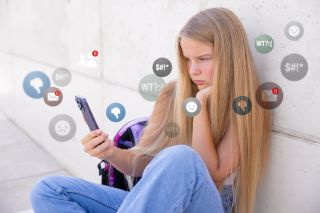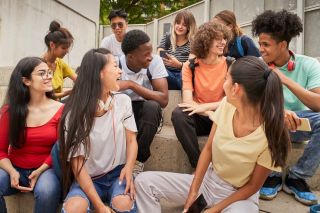Social Media
Social Media's Hollow Promise
Biologically speaking, online connections are not the same as real friendships.
Posted August 1, 2024 Reviewed by Michelle Quirk
Key points
- Don't confuse connections on social media with friendships. They don't produce the same biological benefits.
- Tallies of likes, hearts, and exclamation points on social media feed the brain’s hunger for approval.
- A friendship should fill your emotional tank, not leave you feeling hungry or empty.

A friend recently told me her teenage daughter had 1,700 notifications from Snapchat. On one day! And she felt obliged to respond to every one of them right away. “Why?” I asked. Because she feared she would lose connections to her friends if she didn’t.
That isn’t the way friendship is supposed to work. It’s not supposed to make you feel anxious, worried, or afraid. When I think about friendship, it is a state of safety in which you feel loved, valued, and not alone. It is a promise of someone being there for you no matter what is going on.
A Hollow Promise
There may be massive numbers of connections on social media, but they are not the same as real relationships. To me, they are more like a hollow promise. Instead of feeling known and cared about, the feeling is more like having a tank that is momentarily full and then suddenly empty. It’s a place where threats of loss and rejection are ever-present.
That can’t feel good. As a matter of fact, the fear of rejection feels terrible. Yes, online there are a lot of people out there, for sure, maybe like an audience clapping, but deep relationship and friendship? No, not that.
The Biology of Human Connection
Then the scientist in me began to think about this. Human connection is a powerful biological force. It is the force that enables a baby to grow into a whole human being. It is a cornerstone in the building blocks for learning. It is an essential feature in leadership and team building. It fuels motivation and peak performance. It enables us to heal and forgive when something goes wrong. It is a deep and enduring emotional bond that connects one person to another across time and space.

This is big stuff, and I mean big stuff biologically. When we have a strong attachment to another person, to someone who has our back, it triggers a cascade of hormones and neurotransmitters, such as oxytocin and dopamine, that produce feelings of love, trust, and confidence. It is one of the best feelings in the world.
Social Media and the Brain
Is the biological experience on social media the same as a deeply felt human relationship? Well, it turns out that our biology kicks in online, too, but not in the same way. Social media triggers biological circuits in the brain, and the people who invented it know this neurobiology well. When they engineered their applications, they had our reward circuits, dopamine pathways, in mind.
Images, videos, emojis, and tallies of likes, hearts, and exclamation points feed the brain’s hunger for approval, its craving for novelty. Satisfaction produces a rush. We like a rush—whether from winning a video game, using addictive substances, or reactions to a post on social media. But the moment when the rush ends feels pretty bad, and then the hunger kicks in again for more.
Transactions vs. Relationships
A vibration from a notification can trigger a frenzy of insecurity: Did I react the right way? Fast enough? It can feel like it is never enough, a thirst that can’t be quenched, a meal that leaves you hungrier than you were at the start, empty even. This is a cycle much like addiction, but here the substance is a sense of a connection and relationship that ends up as emptiness, disappointment, a hollow promise.
A transaction and a relationship are not the same thing. With so many young people talking about emptiness, loneliness, and sadness, I think it is time to mobilize our will to reject the hollow promise for what it is and choose relationships that come with sunlight—with people who make you feel like your best self, that you belong and are worthy of love. That kind of promise is as solid as they come.


